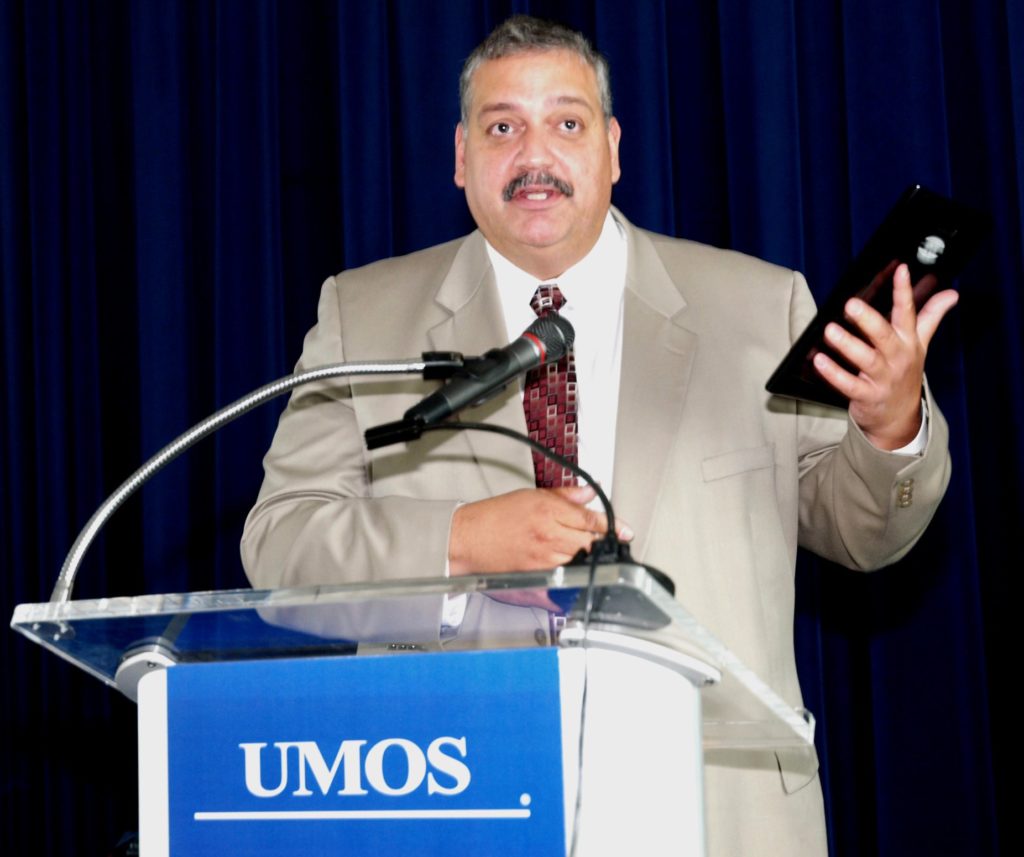Victor Huyke will tell you the “news gene” in his family skipped a generation.
His great grandfather and grandfather both owned newspapers, but his father decided to follow the food industry all the way to Milwaukee.
The Puerto-Rican-born owner of El Conquistador, an English and Spanish-language newspaper, started working at the Shepherd Express’ fore-bearer, the Crazy Shepherd.
Then after a while, he and a few friends started a newspaper in their basement.
That paper now boasts the title of Wisconsin’s #1 Latino newspaper, covering events in Milwaukee, Waukesha, Racine and Kenosha.

At first, they printed in English and Castilian Spanish, but they eventually went to the regional Spanish spoken in Telenovas.
That nuance was one of many Huyke has had to reconcile as the owner of a bilingual newspaper.
“It is complex and not complex,” he said. “We like to be neutral about the story; we like to present both sides and let the reader make that decision.”
This has made covering immigration particularly difficult. Especially since Huyke said many of the Hispanics who have come to cities like Milwaukee without authorization are fleeing danger from either violence or poverty.
“There are piles and piles of coats, jackets, and shoes and people are so exhausted,” he said, describing border crossing paths.
Many who cross do so under the burden of an impossible dilemma, Huyke said: “Do I wait five years on this waiting list to come legally and feed my family? Or do I take my chances, cross the border and feed my family now?”
As Media Milwaukee’s review of the statistics illustrate, most avoid trouble with the law if they can.
Huyke said that’s not by accident.
“In 2000, the Latino population in Milwaukee was huge. Houses were being bought, insurance was being paid,” he said. “They go out of their way to make sure no red flags, no red lights pop up around them.”
And most of the time, they don’t. When they do, Huyke said it’s usually from men who come without their families and turn to alcoholism to cope with the separation.
“They are ones who are here alone and their families are back home. Then they start drinking to help them go to sleep, the next thing you know, they are not sleeping, they’re driving, they’re partying,” he said. “When you look at the culture, the male dominance, it prevents people from telling them I’m hurting. You keep quiet, you drink until the cops finally catch you.”
Huyke said those arrests are the most stressful on the community.
“When you are saying you are coming after a hardcore criminal, a guy who got drunk is not a hardcore criminal,” he said.
For Huyke, it’s not a matter of lawlessness. “Nobody wants a mass murderer living next door to him — but when you start looking at the arrests that have been made, it can be people who had a bad lane change or were drunk,” he said.
And he said it’s unfair to target young men who have made the same bad decision millions of other American citizens make.
For example, Huyke can remember when unauthorized immigants only had to pay a fine if they were caught with a busted taillight. Now, he said, they have to worry about being deported.
“These are the guys that are coming in, they don’t care if you have a clean record, a bad record, whatever. Their whole mission is, I have got orders, you are on those papers, you are done,” Huyke said about ICE. “It’s hard to have a heart when you are doing this job, so I can understand.”
Over the past 21 years of running El Conquistador, it’s just one of the things Huyke has come to understand.
Another is the education, income and English-language gap between Milwaukee’s and Waukesha’s Latino population.
Historically, construction of the freeway pushed out Latino families who relocated to the southside, where there were more factory jobs. As they sent their children to better schools, those generations moved to areas in Waukesha, resulting in a socioeconomic gap. Now, Latinos in Milwaukee speak Spanish more often and usually have a lower economic standing than those in Waukesha.
Huyge said the gap has resulted in different attitudes, especially from more recent generations of Latinos.
“I’ve seen third-generation Latinos who even say, ‘Lock them up, throw away the key.’ And it’s kind of heartbreaking when you see them,” he said, adding, “You’ve been educated, you’re making money; greed plays a factor, selfishness plays a factor.”
For the country to move forward, Huyke said the millions of unauthorized immigrants already here should be able to become citizens.
Most of them are hiding in plain sight, he said, but they always live with the fear that their families could be broken apart at any time.
“[Trump] says whatever he wants on TV and he walks away … (but) they live with that fear,” he said. “We should have some sort of a partial amnesty.”